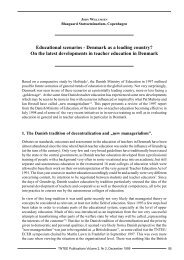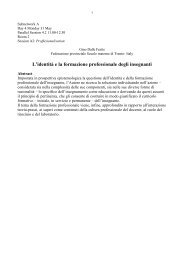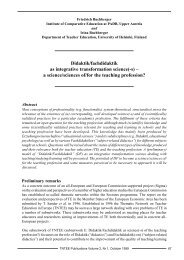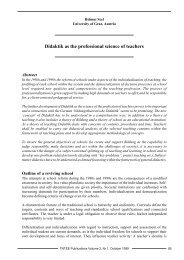TNTEE Publications - Didaktik/Fachdidaktik
TNTEE Publications - Didaktik/Fachdidaktik
TNTEE Publications - Didaktik/Fachdidaktik
You also want an ePaper? Increase the reach of your titles
YUMPU automatically turns print PDFs into web optimized ePapers that Google loves.
Seeking connections between different perspectives on teacher education<br />
considerations ... In the process of individualising its view of students, it has lost any serious sense<br />
of social structures and the race, gender and class relations that form those individuals.<br />
Cultural psychology, activity theory and social practice theory<br />
There are a number of basic assumptions underpinning the cultural psychology of Vygotsky. A<br />
primary assumption is that socio-cultural factors are seen as essential in human development. As<br />
individuals we are seen to be constituted by our social, historical and cultural experience. The<br />
social context is not seen as causative (e.g. of disequilibrium, accommodation etc in Piagetian<br />
terms) but rather as constitutive. Intellectual development is seen in terms of: meaning making,<br />
memory, attention, thinking, perception and consciousness that evolves from the interpersonal to<br />
the intrapersonal. The process of development itself is conceived of as “a complex, dialectical<br />
process characterised by a multifaceted, periodic timetable ... by complex mixing of external and<br />
internal factors, and by the process of adaptation and surmounting of difficulties” (Vygotsky, 1981).<br />
The social dimension is seen to be primary in both time and fact and the individual dimension is<br />
derivative and secondary. Writing from such a perspective, Lerman (1996) highlights the way that<br />
language provides the tools for thought, and carries the cultural inheritance of the communities<br />
(ethnic, gender, class, etc) in which the individual grows up. Consequently language is not seen as<br />
giving structure to the already conscious cognising mind but, on the contrary, the mind is seen to be<br />
constituted in discursive practices. He offers the following quotation from Kozulin:<br />
It is incorrect to consider language as correlative of thought; language is a correlative of<br />
consciousness. The mode of language correlative to consciousness is meanings. The work of<br />
consciousness with meanings leads to the generation of sense, and in the process consciousness<br />
acquires a sensible (meaningful) structure. To study human consciousness means to study this sensible<br />
structure, and verbal meaning is the methodological unit of this study. Such a study can be carried<br />
out at the abstractive as well as the concrete level. At the level of abstract psychology we can study<br />
general rules of signification; at the concrete level we should be concerned with the specific “sense<br />
generating” activity that changes the consciousness of a person.<br />
(Kozulin, 1990, p.190)<br />
Vygotsky highlighted the dialectical nature of thought and language by proposing that these have<br />
separate roots. Speech is seen to evolve out of gestures developed within the context of<br />
communication and social interaction whilst thought (especially logical thought) evolves from the<br />
child’s activity. It is further proposed that speech can be considered to have two particular forms –<br />
egocentric and communicative respectively. The function of communicative speech, as implied in<br />
its description, is for the purpose of communication with others. On the other hand, the function of<br />
egocentric speech is as an instrument of thought itself i.e. a psychological tool. This leads to<br />
Vygotsky’s notion of internalisation, by which the means of social interaction, especially speech,<br />
are taken over by the learner and internalised. Development proceeds when interpsychological<br />
regulation is transformed into intrapsychological regulation.<br />
The mediational role of cultural and psychological tools reflects the emphasis of Marxist philosophy<br />
on the central role of labour in cultural development. This stresses the transformation of objects<br />
using tools in this process. The notion of the psychological tool was first introduced by Vygotsky as<br />
an analogy with the material tool e.g. a chisel, which serves as a mediator between the human hand<br />
and the object upon which the tool acts. For example the computer can be viewed as a cultural tool<br />
which is itself transformed into a psychological tool by means of social interaction. The idea of the<br />
mediational role of tools is extended to psychological tools such as sign and symbol systems e.g.<br />
language, writing, number systems (semiotics).<br />
<strong>TNTEE</strong> <strong>Publications</strong> Volume 2, Nr 1, October 1999 39








